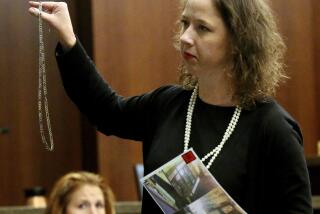Killer Sought in Boston Death of Gang Prosecutor
- Share via
BOSTON — Police launched a massive manhunt Tuesday for the killer of Paul R. McLaughlin, a veteran state prosecutor who specialized in gang cases, who was shot to death execution-style Monday night.
Two shots were fired point-blank into the temple of the 42-year-old assistant attorney general as he sat in his car in a commuter train parking lot. Police said that nothing had been taken from McLaughlin’s Toyota Tercel.
Officials nonetheless balked at characterizing his death as a gang murder. “At this point we can’t rule anything in and we can’t rule anything out,” said Ralph G. Martin II, the district attorney of Middlesex County and a longtime friend of McLaughlin’s.
But one police source, insisting on anonymity, said investigators were examining the possibility that a 14- to 15-year-old male seen fleeing the murder scene might have been “a paid hit-man brought in from the [Caribbean] islands.” The police source said such a modus operandi is “not unusual” in gang murders.
McLaughlin, described by state Atty. Gen. Scott Harshbarger as a “quiet, unassuming and unsung hero who largely did this thankless job in anonymity,” was head of a special state task force targeting gang members.
A dedicated criminal lawyer, McLaughlin had a 95% conviction record in the 134 cases he prosecuted. Martin said investigators were carefully studying McLaughlin’s files in hopes of turning up new evidence.
A police superintendent, James Claiborne, said vengeance was one possible motive for the killing but added: “It doesn’t usually happen to DA’s. It doesn’t make sense.”
Moments after the shooting, just after 7 p.m. Monday, police and canine units chased a lone suspect down the commuter train tracks in the predominantly white middle- and working-class neighborhood of West Roxbury. McLaughlin was raised in the neighborhood and remained a popular and familiar figure there, coaching a Little League baseball team.
At least two witnesses described the alleged assailant as a slender African American male, 14 or 15 years old, 5 feet 6 inches tall, and wearing baggy jeans and a hooded sweat-shirt.
Boston City Council member Gareth R. Saunders, a leader of the city’s black community, immediately urged his constituents to come forward with any information they might have in the McLaughlin murder. But he also expressed concerns that the search for the killer could escalate into “an irrational racial witch hunt.”
Saunders called the “hysteria” surrounding McLaughlin’s killing reminiscent of the mood that enveloped the city following the 1989 shooting of Carol DiMaiti Stuart, in which her husband maintained that a black gunman had shot them both. When evidence pointed in his direction, Charles Stuart jumped to his death from a bridge without acknowledging a role in his wife’s death.
“Again, six years later, I sense a ‘get the young black male at any cost’ attitude developing,” Saunders said.
But district attorney Martin, also an African American, was loath to bring race into the investigation. Rather, Martin praised his former colleague as “a white Irish Catholic guy who could have done anything he wanted, and he chose to serve the poor and the minority community.”
Still, the notion that gang violence might be directed at a high-ranking public official left the city reeling.
“This is supposed to happen in banana republics. This is not supposed to happen in Boston,” said Paul Nace, a longtime Democratic party organizer, fund-raiser and prominent real estate developer.
Lauding McLaughlin as “one of our heroes,” Mayor Thomas M. Menino said: “Here is a guy like Paul McLaughlin who gave all his time freely to fight gang crime, and a punk comes along and kills him and devastates the community.”
But Malcolm W. Klein, a USC sociologist who studies gang behavior, cautioned against leaping to conclusions. “I would want to know what this guy was investigating. If someone has put a hit on him, the chances that it’s a normal street gang are very slim.”
However, if McLaughlin had been prosecuting drug cases, Klein said, violence was not unlikely. “Drug gangs will use violence purposely because they are in a marketing situation.”
From his home in Osterville, on Cape Cod, Edward F. McLaughlin Jr. described his son’s killing as “a hit job, no question about it.” The senior McLaughlin, a former lieutenant governor who sailed aboard PT-109 with the late President John F. Kennedy, scoffed at the possibility that his son was the victim of a random shooting.
“Shooting public officials,” he said. “This is just crazy.”
At a press conference late Tuesday, Boston Police Commissioner Paul Evans decried the coldblooded nature of McLaughlin’s murder.
No motive has been ruled out, Evans said, noting that the investigation is young. “But we have not ruled out the possibility that Paul was killed because he was a member of the law enforcement community, the possibility that it was an attack on the entire criminal justice system and the people of this city who are protected by that system.”
More to Read
Sign up for Essential California
The most important California stories and recommendations in your inbox every morning.
You may occasionally receive promotional content from the Los Angeles Times.













